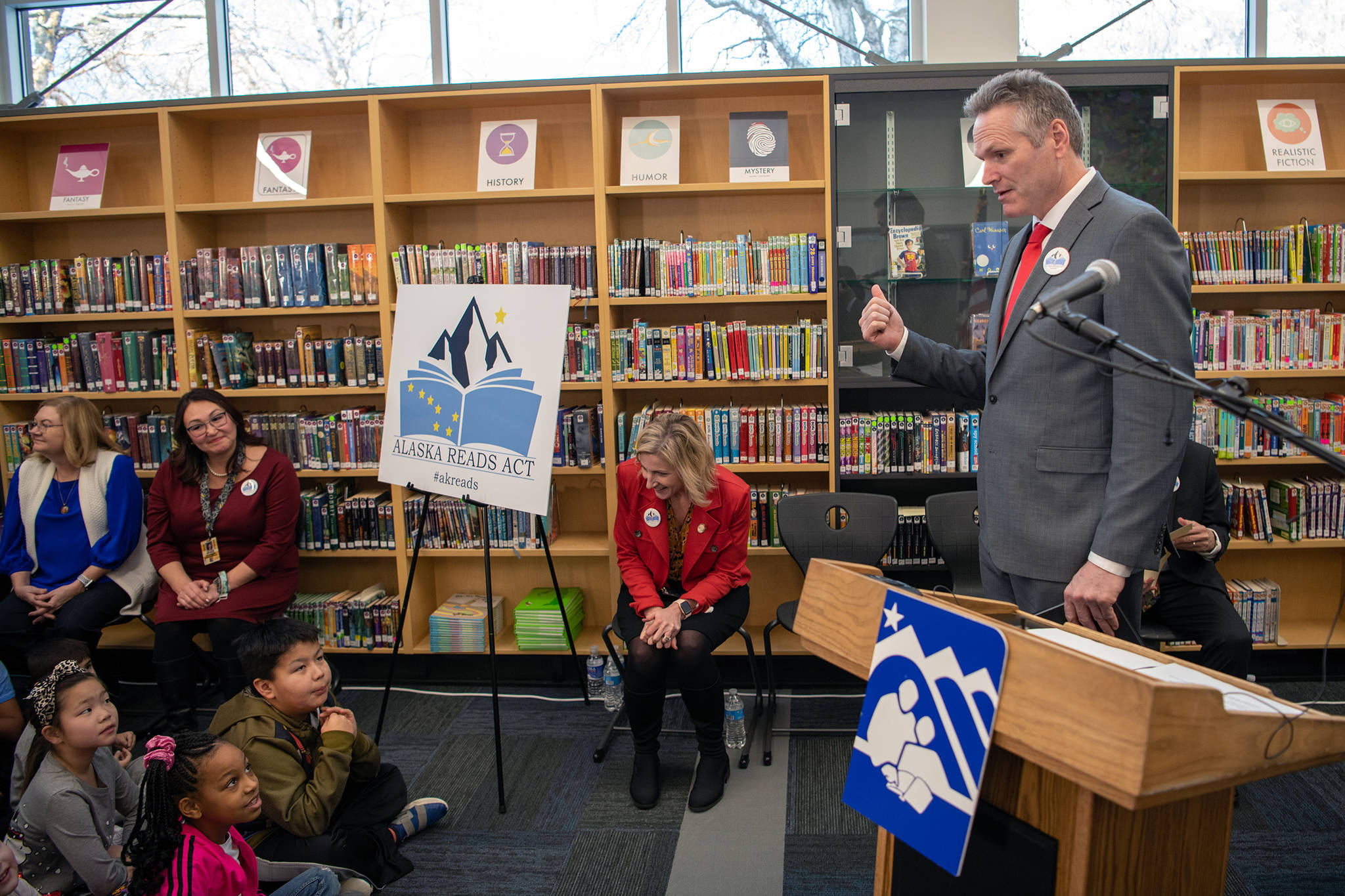A new bill could mean a new chapter for reading proficiency throughout the state, including Juneau.
Gov. Mike Dunleavy and state Sen. Tom Begich, D-Anchorage, unveiled the idea of the Alaska Reads Act at a Wednesday press conference in Turnagain Elementary School in Anchorage. The bill, which cannot be prefiled, would seek to make every kid in Alaska proficient in reading by the end of third grade.
“What it means for Juneau is more monetary resources,” said Rep. Andi Story, D-Juneau, who is co-chair of the House Education Committee, in a phone interview about the bill.
She said while it may take multiple years to become a reality in Juneau, the bill could allow districts to essentially count pre-school students as half-day students in the numbers that are used to determine per-student funding from the state.
Erin Hardin, special assistant for the Alaska Department of Education and Early Development, explained that could be done through preschool grants included in the bill that would prioritize lowest-performing school districts.
“Eventually all districts have the opportunity to apply,” Hardin said.
Districts awarded the grant would need to meet a set of standards over three years, Hardin said, and if they met those standards, the districts would then be able to count 4- and 5-year-olds as half-time students in the funding formula moving forward.
Story, Hardin, Dunleavy and Begich said they expect the bill will be introduced shortly after the Legislature’s session begins next week.
Reading proficiency is statewide weak point, and in Facebook post prior to the press conference introducing the bill, Dunleavy said Alaska is facing a reading crisis.
[National test scores bring more bad news for Alaska schools]
“We believe reading is one of, if not the most important thing, we can give to kids,” Dunleavy said.
He added there is a moral imperative to ensure that kids can read, and during the introduction of the bill, Begich and Dunleavy emphasized the bipartisan nature of the proposal.
Last year, just fewer than 37% of Alaska’s third-grade students were proficient in reading, according to Performance Evaluation for Alaska’s Schools data. Juneau surpassed the state results with more than 41% of third-graders tested at an advanced or proficient level. More than 46% of all students tested at an advanced or proficient level, according to districtwide results.
Alaska Education Commissioner Michael Johnson gave what he called a “very high overview” of components of the bill, that seeks to improve those figures.
Johnson said the bill has three main pieces. Those include expanding pre-kindergarten opportunities throughout the state with a focus on getting students proficient in reading by the time they reach third grade; a screening and intervention effort that includes screening every student and assessing needs; and making strides to improve low-performing schools.
Dunleavy spokesperson Jeff Turner said the governor did not include funding for the bill in his proposed Fiscal Year 2021 budget, and funding is to be determined by the Legislature.
[Dunleavy backs off cuts in proposed budget]
The press conference was light on details regarding what implementing the bill — should it be approved by the Legislature — would look like, but the office of the governor website provided an 11-point explanation of the intended policy.
The page states statewide teacher training on reading instruction and hob-embedded training through department-employed reading specialists are part of the plan; existing state and federal funds would support policy implementation, including funding through grants; an early literacy screening tool that would be administered three times each school year kindergarten through third grade; “timely” notification of parents or guardians for a student identified with a reading difficulties, individual reading plans, monitoring student progress, home reading strategies and programs, interventions, appropriate grade-level progression for students severely below grade level, multiple pathways for demonstrating reading skills required for progression to fourth grade and a good cause exemptions that recognize special needs students, English-language learners and students who experienced delayed grade-level progression.
Johnson said he would like to see the bill implemented as soon as possible so it can begin to take effect in the next school year.
“It’s important that the bill is heard and considered and passed as quickly as possible,” Johnson said.
• Contact reporter Ben Hohenstatt at (907)523-2243 or bhohenstatt@juneauempire.com. Follow him on Twitter at @BenHohenstatt.

